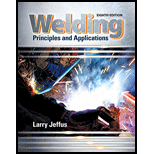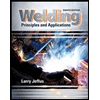
Welding: Principles and Applications (MindTap Course List)
8th Edition
ISBN: 9781305494695
Author: Larry Jeffus
Publisher: Cengage Learning
expand_more
expand_more
format_list_bulleted
Concept explainers
Textbook Question
Chapter 30, Problem 22R
What is the major difference between ESW and EGW?
Expert Solution & Answer
Trending nowThis is a popular solution!

Students have asked these similar questions
4. Determine which of the following flow fields represent a possible
incompressible flow?
(a) u= x²+2y+z; v=x-2y+z;w= -2xy + y² + 2z
a
(b) V=U cose
U coso 1 (9)
[1-9]
Usino |1 (4)]
[+]
V=-Usin 1+1
3. Determine the flow rate through the pipe line show in the figure in ft³/s,
and determine the pressures at A and C, in psi.
5'
B
C
12°
20'
D
6"d
2nd-
Water
A
5. A flow is field given by V = x²₁³+xy, and determine
3
·y³j-
(a) Whether this is a one, two- or three-dimensional flow
(b) Whether it is a possible incompressible flow
(c) Determine the acceleration of a fluid particle at the location (X,Y,Z)=(1,2,3)
(d) Whether the flow is rotational or irrotational flow?
Chapter 30 Solutions
Welding: Principles and Applications (MindTap Course List)
Ch. 30 - What protects the molten SAW pool from the...Ch. 30 - How can manual SA welding gun movement be...Ch. 30 - What are the two methods of mechanical travel for...Ch. 30 - How is the weld metal deposited in the molten weld...Ch. 30 - In what forms can SA welding filler metal be...Ch. 30 - How is the manganese range of the SA electrode...Ch. 30 - Why could a single SA welding flux have more than...Ch. 30 - List the three groupings of SA welding fluxes...Ch. 30 - Why are alloys not added to fused SA fluxes?Ch. 30 - What is in bonded SA fluxes?
Ch. 30 - What must be done with SA fluxes to prevent...Ch. 30 - Prob. 12RCh. 30 - What happens to the unfused SA welding flux?Ch. 30 - Why is some form of mechanical guidance required...Ch. 30 - List the common methods used to start the SA arc.Ch. 30 - Prob. 16RCh. 30 - Prob. 17RCh. 30 - Prob. 18RCh. 30 - How is an ES weld started?Ch. 30 - Prob. 20RCh. 30 - Prob. 21RCh. 30 - What is the major difference between ESW and EGW?Ch. 30 - Prob. 23RCh. 30 - What can be used to produce the force needed to...Ch. 30 - Prob. 25RCh. 30 - What steps can be included in RSW?Ch. 30 - Prob. 27RCh. 30 - Prob. 28RCh. 30 - Prob. 29RCh. 30 - What is the most common joint for seam welds?Ch. 30 - Prob. 31RCh. 30 - Prob. 32RCh. 30 - Why is FW not usually cost-effective for short...Ch. 30 - Prob. 34RCh. 30 - Prob. 35RCh. 30 - Prob. 36RCh. 30 - Prob. 37RCh. 30 - Prob. 38RCh. 30 - How can a misaligned seam be tracked automatically...Ch. 30 - Prob. 40RCh. 30 - Prob. 41RCh. 30 - Prob. 42RCh. 30 - List the steps of the inertia welding process.Ch. 30 - Prob. 44RCh. 30 - Prob. 45RCh. 30 - Prob. 46RCh. 30 - Prob. 47RCh. 30 - Why is THSP known as a cold buildup process?Ch. 30 - Which thermal spray process can be used to apply...Ch. 30 - Why should thermal spray coats be applied as thin...Ch. 30 - What is the advantage of using an inert gas for...Ch. 30 - Prob. 52RCh. 30 - Prob. 53RCh. 30 - Prob. 54RCh. 30 - Prob. 55RCh. 30 - Prob. 56RCh. 30 - Prob. 57RCh. 30 - Prob. 58RCh. 30 - Prob. 59RCh. 30 - How can wear provide a self-sharpening effect on...Ch. 30 - Prob. 61R
Knowledge Booster
Learn more about
Need a deep-dive on the concept behind this application? Look no further. Learn more about this topic, mechanical-engineering and related others by exploring similar questions and additional content below.Similar questions
- Solve this problem and show all of the workarrow_forwardSolve this problem and show all of the workarrow_forwarddraw the pneumatic circuit to operate a double-acting cylinder with: 1. Extension: Any of two manual conditions plus cylinder fully retracted, → Extension has both meter-in and meter-out, 2. Retraction: one manual conditions plus cylinder fully extended, → Retraction is very fast using quick exhaust valve.arrow_forward
- Correct answer is written below. Detailed and complete solution with fbd only. I will upvote, thank you. Expert solution plsarrow_forwardCorrect answer is written below. Detailed and complete solution with fbd only. I will upvote, thank you.arrow_forwardCorrect answer is written below. Detailed and complete solution with fbd only. I will upvote, thank you.arrow_forward
- Correct answer is written below. Detailed and complete solution only with fbd. I will upvote, thank you.arrow_forwardCorrect answer is written below. Detailed and complete solution only. I will upvote, thank you.arrow_forwardCorrect answer is written below. Detailed and complete solution with fbd only. I will upvote, thank you.arrow_forward
- Correct answer is written below. Detailed and complete solution only. I will upvote, thank you.arrow_forwardCorrect answer is written below. Detailed and complete solution with fbd only. I will upvote, thank you.arrow_forwardCorrect answer is written below. Detailed and complete solution only. I will upvote, thank you.arrow_forward
arrow_back_ios
SEE MORE QUESTIONS
arrow_forward_ios
Recommended textbooks for you
 Welding: Principles and Applications (MindTap Cou...Mechanical EngineeringISBN:9781305494695Author:Larry JeffusPublisher:Cengage Learning
Welding: Principles and Applications (MindTap Cou...Mechanical EngineeringISBN:9781305494695Author:Larry JeffusPublisher:Cengage Learning

Welding: Principles and Applications (MindTap Cou...
Mechanical Engineering
ISBN:9781305494695
Author:Larry Jeffus
Publisher:Cengage Learning
Physics - Thermodynamics: (21 of 22) Change Of State: Process Summary; Author: Michel van Biezen;https://www.youtube.com/watch?v=AzmXVvxXN70;License: Standard Youtube License